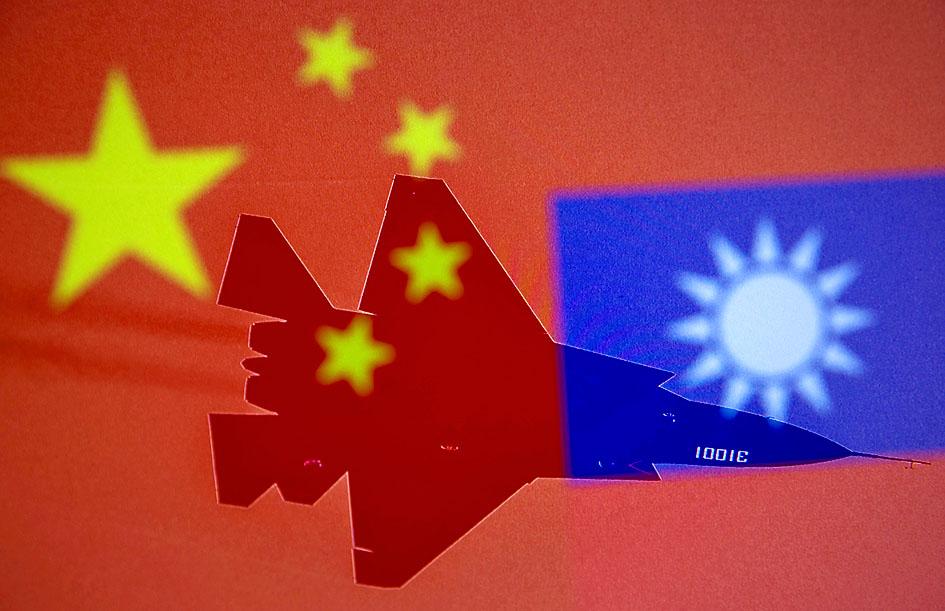The military should reconsider its policy of refraining from launching a first strike in the face of increasing Chinese aggression, former National Defense University distinguished lecturer Holmes Liao (廖宏祥) said yesterday.
A total of 150 Chinese warplanes entered Taiwan’s air defense identification zone in the first five days of this month, Ministry of National Defense data showed.
Asked about the guiding principle in the military’s response to Chinese aggression, Minister of National Defense Chiu Kuo-cheng (邱國正) told lawmakers on Wednesday: “The military holds to the principle that we will not fire the first shot.”

Photo: Reuters
Liao said that President Tsai Ing-wen’s (蔡英文) directive of avoiding provocation and adventurism has been recast by the ministry into “a form of passive defeatism.”
“The defense ministry’s renunciation of the right and capability to strike first shows that the overall direction of the military is wrong and that our national defense strategy is cowardly,” he said.
More than two decades ago, the Chinese People’s Liberation Army (PLA) declared that the first battle would be the decisive battle in the event of war with Taiwan, he said.
This means the PLA intends to attack with overwhelming force and speed while taking full advantage of the element of surprise to achieve victory in the shortest possible time, he said.
Although the air force has clear guidelines on how to respond to Chinese warplanes crossing the median line, the 30-nautical-mile (55.6km) line and the 12-nautical-mile line, these set responses are of a dubious tactical value, he said.
“With just minutes of warning, our pilots might not even have time to take off before the enemy aircraft commences aerial bombing,” he said.
The military should also assume that the PLA would utilize short-range tactical missiles to attack air base runways, air defense radars and missile batteries, communication hubs and command centers, he said.
Such attacks might render Taiwanese forces incapable of launching counterstrikes or staging an effective defense of the country, he said.
During the tenure of then minister of national defense Yen De-fa (嚴德發), who held the position from February 2018 to February this year, air force pilots were instructed to never fire on the enemy without orders and that those who did would be arrested and tried, Liao said, citing an unnamed officer.
Fighter pilots should have the freedom to judge the situation for themselves when they are actively carrying out a mission, Liao said, adding that it is too late to grant them the authority to use their weapons only after the enemy has locked on them.
“Pilots go through years of training so that they can exercise judgement on how best to defend themselves,” he said. “It is not acceptable that they are being threatened with court martial even as we send them into dangerous situations.”
“A country that puts soldiers in such a dilemma is close to betraying them,” he said.

Chinese Nationalist Party (KMT) Chairman Eric Chu (朱立倫), spokeswoman Yang Chih-yu (楊智伃) and Legislator Hsieh Lung-chieh (謝龍介) would be summoned by police for questioning for leading an illegal assembly on Thursday evening last week, Minister of the Interior Liu Shyh-fang (劉世芳) said today. The three KMT officials led an assembly outside the Taipei City Prosecutors’ Office, a restricted area where public assembly is not allowed, protesting the questioning of several KMT staff and searches of KMT headquarters and offices in a recall petition forgery case. Chu, Yang and Hsieh are all suspected of contravening the Assembly and Parade Act (集會遊行法) by holding

PRAISE: Japanese visitor Takashi Kubota said the Taiwanese temple architecture images showcased in the AI Art Gallery were the most impressive displays he saw Taiwan does not have an official pavilion at the World Expo in Osaka, Japan, because of its diplomatic predicament, but the government-backed Tech World pavilion is drawing interest with its unique recreations of works by Taiwanese artists. The pavilion features an artificial intelligence (AI)-based art gallery showcasing works of famous Taiwanese artists from the Japanese colonial period using innovative technologies. Among its main simulated displays are Eastern gouache paintings by Chen Chin (陳進), Lin Yu-shan (林玉山) and Kuo Hsueh-hu (郭雪湖), who were the three young Taiwanese painters selected for the East Asian Painting exhibition in 1927. Gouache is a water-based

Taiwan would welcome the return of Honduras as a diplomatic ally if its next president decides to make such a move, Minister of Foreign Affairs Lin Chia-lung (林佳龍) said yesterday. “Of course, we would welcome Honduras if they want to restore diplomatic ties with Taiwan after their elections,” Lin said at a meeting of the legislature’s Foreign Affairs and National Defense Committee, when asked to comment on statements made by two of the three Honduran presidential candidates during the presidential campaign in the Central American country. Taiwan is paying close attention to the region as a whole in the wake of a

OFF-TARGET: More than 30,000 participants were expected to take part in the Games next month, but only 6,550 foreign and 19,400 Taiwanese athletes have registered Taipei city councilors yesterday blasted the organizers of next month’s World Masters Games over sudden timetable and venue changes, which they said have caused thousands of participants to back out of the international sporting event, among other organizational issues. They also cited visa delays and political interference by China as reasons many foreign athletes are requesting refunds for the event, to be held from May 17 to 30. Jointly organized by the Taipei and New Taipei City governments, the games have been rocked by numerous controversies since preparations began in 2020. Taipei City Councilor Lin Yen-feng (林延鳳) said yesterday that new measures by